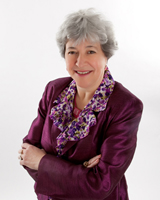Ask the Expert: Judith Kolberg
 Judith Kolberg, FileHeadsThe 2013 “Ask the Expert” interviews continue with a dynamic and inspiring group of people! Last month, organizer and coach, Sue West, talked with us about fresh starts. This month, I’m excited to have with us the extraordinary pioneer and innovator in chronic disorganization and the organizing industry, Judith Kolberg, to share her thoughts about change.
Judith Kolberg, FileHeadsThe 2013 “Ask the Expert” interviews continue with a dynamic and inspiring group of people! Last month, organizer and coach, Sue West, talked with us about fresh starts. This month, I’m excited to have with us the extraordinary pioneer and innovator in chronic disorganization and the organizing industry, Judith Kolberg, to share her thoughts about change.
Judith and I met in 1995 at the National Association of Professional Organizers (NAPO) conference in Dallas. She was running a panel called “Is This Your Client?” It was the first time I heard anyone talk about chronic disorganization, and immediately identified that most of my clients had similar challenges. Since then Judith and I have engaged in many wonderful conversations about organizing, publishing, family, and even cowboy boots. I’ve always admired her intelligence, warmth, directness, and fabulous sense of humor. I am honored to know her as a friend, mentor, and colleague. My deepest gratitude and thanks goes to Judith for taking the time to join us. Before we begin, here’s more about her.
Judith Kolberg pioneered FileHeads Professional Organizers in 1989. She founded the National Study Group on Chronic Disorganization, the precursor to the Institute for Challenging Disorganization (ICD) and is credited with launching a field of professional organizing dedicated to helping individuals challenged by chronic disorganization. She is an industry-futurist, innovator, and recipient of the industry’s highest honors including the Judith Kolberg Award. Several of the books Judith authored, such as Conquering Chronic Disorganization, are required reading for industry certification programs. Her books have sold over a quarter of million copies. She is a popular speaker and a featured organizer on the “Buried Alive” hoarding series. A native of New York, Judith lives in Atlanta, GA where she takes care of her Mom, sees clients, writes, and publishes. You can connect with Judith on Facebook, organizing or publishing websites, and blog.
Linda Samuels: You’re a pioneer in the professional organizing industry and an expert on helping others creatively navigate change. What motivates people to change?
Judith Kolberg: Money, sex, getting someone off our back, desperation – lots of things. In the organizing context a person changes from not-so-organized to more organized usually because they see getting organized as a means to another end. Yes, there is its own reward, but usually they make the effort to change because it will result in a living environment they enjoy being in more and that they want other people to enjoy more. Really, it is that simple.
Linda: Change can be scary and overwhelming. What strategies can we use to help move past our fears?
Judith: My favorite is to draw on their experience. If they are an adult, somewhere in their lifetime they’ve made a big a change and survived it. Maybe they moved, ditched a spouse, left a job and started a new career. If people can remember that it was difficult but they made it, that’s helpful to them. If I can help them identify what strengths they used that can be re-used, that’s good too. Are they persistent? Maybe they’re strong decision-makers? Perhaps they are realists? Anything can be leveraged.
Linda: How can we identify when it’s time for change? Are there change indicators?
Judith: Change indicators, an interesting word. At the dawn of my 60th birthday, I realize the life I am living is just not right. It does not suit who I am well enough. I know I could be happier. Lots of changes ahead. I’m not sure if there are indicators so much as there are gaps, inconsistencies, disconnects. For my clients, changing what they are doing organizationally often is associated with other changes or transitions. What’s new that has put the change on the agenda now? I often ask.
Linda: Do you have a philosophy about change?
Judith: If you toss a cat gently in the air it may twist and turn slightly but it will land on its feet. That’s the closest I can come.
Linda: What has been your biggest personal challenge around change?
Judith: My biggest personal challenge with change is that I tend to wait too long. We do what we need to do when we’re ready, and sometimes to make a change it’s the wrong time, but you do it with your knees knocking.
Thank you, Judith for your insights about change. There are several things you said that resonated with me. I love how you talked about leveraging strengths and prior experiences as a strategy to move past our fears. Then there’s the idea about “knees knocking.” While change can certainly be exciting and energy producing, it can also scare the pants right off of us. However, being able to push past that fear in pursuit of different, as our knees are shaking and heart is palpitating, is often how change and growth is experienced.
I invite all of you to join Judith and me as the conversation continues. We’d love to hear your thoughts about change or anything else you’d like to share. What are you thinking about?
